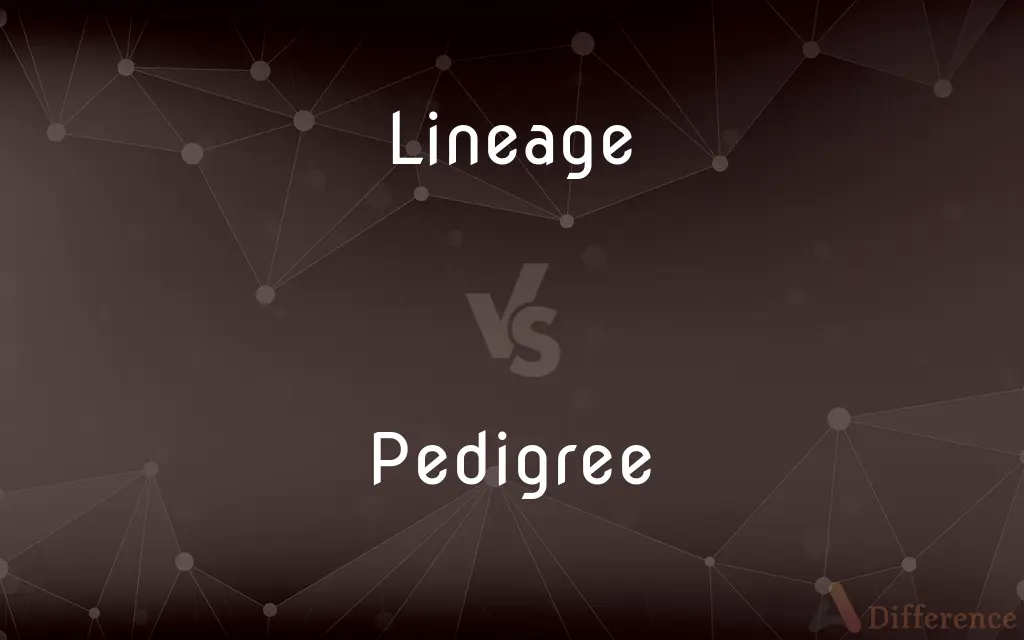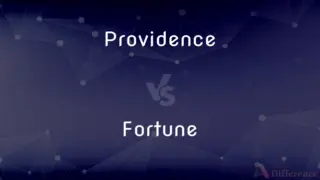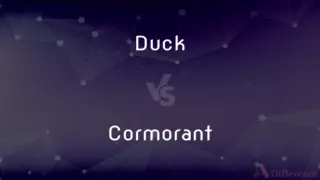Lineage vs. Pedigree — What's the Difference?
Edited by Tayyaba Rehman — By Fiza Rafique — Updated on May 7, 2024
Lineage refers to direct descent from an ancestor, often tracing familial lines over generations, while pedigree is a recorded ancestry or genealogical chart, typically for animals but also for people, emphasizing purebred or distinguished backgrounds.

Difference Between Lineage and Pedigree
Table of Contents
ADVERTISEMENT
Key Differences
Lineage focuses on a family line descending from a common ancestor, showcasing one's ancestry across multiple generations. Pedigree, on the other hand, is a formal chart or record often used to trace an individual's or animal's ancestry, particularly for ensuring purebred status.
Lineage provides an understanding of family heritage, often emphasizing cultural or historical connections, whereas pedigree provides verified genealogical information, particularly used to evaluate breeding quality and heritage.
Lineage is more about heritage and descent, often emphasizing personal or familial history. Pedigree is more technical, involving detailed documentation, primarily in breeding or aristocratic contexts to ensure the lineage is of high quality.
Lineage can sometimes involve oral traditions or less formal records, while pedigree usually requires official documents or charts to verify each generational link.
Lineage has a broader application in understanding family or cultural ancestry, while pedigree is specific and sometimes exclusive, emphasizing pure ancestry or noble descent.
ADVERTISEMENT
Comparison Chart
Definition
Direct descent from an ancestor
Documented or recorded genealogy
Focus
Family history or descent
Breeding quality and heritage
Documentation
Can be informal or oral
Detailed and formalized
Use
Understanding family ancestry
Evaluating quality or purebred status
Application
People, families
Animals, aristocracy
Compare with Definitions
Lineage
Direct descent from a common ancestor.
His lineage can be traced back to ancient European royalty.
Pedigree
A record of purebred animal ancestry.
The horse's pedigree confirmed its champion lineage.
Lineage
Ancestry or heritage related to a specific group or tradition.
She felt proud of her lineage and cultural background.
Pedigree
Distinguished family background.
The politician touted his noble pedigree to gain support.
Lineage
The line of family descent through successive generations.
The family maintained records of their lineage across centuries.
Pedigree
Verified lineage for a specific purpose, often breeding.
The farm focused on maintaining pedigree among their livestock.
Lineage
A sequence of ancestors or descendants in a family.
Their lineage includes generations of skilled craftsmen.
Pedigree
A genealogical chart showing ancestry.
The breeder presented the dog's pedigree to the new owner.
Lineage
A group's shared familial heritage.
The tribe carefully preserved their lineage and customs.
Pedigree
Documentation of an individual's or animal's hereditary status.
The university sought scholars with a solid academic pedigree.
Lineage
Direct descent from a particular ancestor; ancestry.
Pedigree
A line of ancestors; a lineage.
Lineage
Derivation.
Pedigree
A list of ancestors; a family tree.
Lineage
The descendants of a common ancestor considered to be the founder of the line.
Pedigree
A chart of an individual's ancestors used in human genetics to analyze Mendelian inheritance of certain traits, especially of familial diseases.
Lineage
Variant of linage.
Pedigree
A list of the ancestors of a purebred animal.
Lineage
The number of lines of printed or written material.
Pedigree
A continuous history or series of precedents, especially considered as evidence of respectability or legitimacy
"The practice of larding legislation with special interest lucre has, of course, a lengthy pedigree in American politics" (Jonathan Chait).
Lineage
Payment for written work at a specified amount per line.
Pedigree
A chart, list, or record of ancestors, to show breeding, especially distinguished breeding.
Lineage
Descent in a line from a common progenitor; progeny; descending line of offspring or ascending line of parentage.
Pedigree
A person's ancestral history; ancestry, lineage.
Lineage
(advertising) A number of lines of text in a column.
Pedigree
(uncountable) Good breeding or ancestry.
Lineage
A fee or rate paid per line of text.
Pedigree
The history or provenance of an idea, custom etc.
Lineage
Descent in a line from a common progenitor; progeny; race; descending line of offspring or ascending line of parentage.
Both the lineage and the certain sireFrom which I sprung, from me are hidden yet.
Pedigree
The ancestry of a domesticated animal, especially a dog or horse.
Lineage
The descendants of one individual;
His entire lineage has been warriors
Pedigree
Having a pedigree.
Lineage
The kinship relation between an individual and the individual's progenitors
Pedigree
Purebred.
Lineage
The number of lines in a piece of printed material
Pedigree
(transitive) To determine the pedigree of (an animal).
Lineage
A rate of payment for written material that is measured according to the number of lines submitted
Pedigree
A line of ancestors; descent; lineage; genealogy; a register or record of a line of ancestors.
Alterations of surnames . . . have obscured the truth of our pedigrees.
His vanity labored to contrive us a pedigree.
I am no herald to inquire of men's pedigrees.
The Jews preserved the pedigrees of their tribes.
Lineage
Inherited properties shared with others of your bloodline
Pedigree
A record of the lineage or strain of an animal, as of a horse.
Pedigree
The descendants of one individual;
His entire lineage has been warriors
Pedigree
Line of descent of a pure-bred animal
Pedigree
Ancestry of a purebred animal
Pedigree
Having a list of ancestors as proof of being a purebred animal
Common Curiosities
How is lineage usually traced?
Lineage can be traced through family records, oral traditions, or genealogical research.
Is pedigree only used for animals?
No, it is often used for animals but can also apply to people, particularly in aristocratic or distinguished backgrounds.
What does lineage refer to in family history?
Lineage refers to direct descent from an ancestor, tracing a family's historical roots.
How is a pedigree different from lineage?
Pedigree is a recorded chart of ancestry, often emphasizing purebred status, while lineage refers to the family descent itself.
Can a pedigree chart be used for any animal?
Yes, pedigree charts are used for many animals, especially those bred for specific qualities like horses or dogs.
Are lineage and pedigree related to inheritance?
Both can affect inheritance, as they clarify family ties and heritage.
Do lineage records require formal documents?
Not always; lineage may be traced through informal or oral records as well.
How long are pedigree charts typically maintained?
They can be maintained for many generations, especially for breeding or aristocratic families.
Do lineage and pedigree have any legal importance?
Both can have legal importance in inheritance, property rights, or breeding regulations.
What makes a pedigree important in breeding?
Pedigree ensures purebred status and tracks desirable traits across generations.
Can a person have a pedigree?
Yes, especially in aristocratic contexts or distinguished family backgrounds.
Can someone have an unbroken lineage but not a pedigree?
Yes, if the family heritage is known but not formally documented.
Are there other terms similar to pedigree?
Yes, terms like ancestry, genealogy, and heritage are related but differ in specific usage.
Is pedigree more important than lineage?
Not necessarily; it depends on the context. Pedigree is vital for breeding, while lineage is crucial for understanding heritage.
Can modern technology help with tracing lineage or pedigree?
Yes, DNA testing and genealogical databases significantly improve tracing accuracy.
Share Your Discovery

Previous Comparison
Providence vs. Fortune
Next Comparison
Duck vs. CormorantAuthor Spotlight
Written by
Fiza RafiqueFiza Rafique is a skilled content writer at AskDifference.com, where she meticulously refines and enhances written pieces. Drawing from her vast editorial expertise, Fiza ensures clarity, accuracy, and precision in every article. Passionate about language, she continually seeks to elevate the quality of content for readers worldwide.
Edited by
Tayyaba RehmanTayyaba Rehman is a distinguished writer, currently serving as a primary contributor to askdifference.com. As a researcher in semantics and etymology, Tayyaba's passion for the complexity of languages and their distinctions has found a perfect home on the platform. Tayyaba delves into the intricacies of language, distinguishing between commonly confused words and phrases, thereby providing clarity for readers worldwide.











































